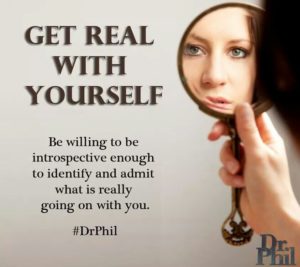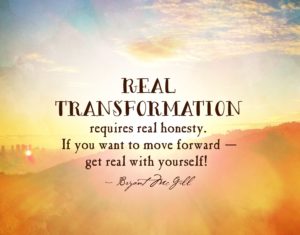
Most of us grew up hearing how important it is to be honest with others but we seldom heard the importance of self-honesty. Self-honesty requires courage to face the truth and ask tough questions. Dealing with the truth empowers you to be honest with yourself and allows our best self to emerge. (Estimated reading time: 6 minutes)
“I’d rather be damned by my honesty, than caged by my lies.”
— Omega Maverick
We all know the importance of being honest in our dealings with others. This is an ethical principle that we’ve all been raised with and constantly encouraged to practice—and rightly so.
But not many of us have been schooled in the art of self-honesty and why it’s important to be honest with yourself . This is where we turn the lens of honesty inward to take an objective view of ourselves. It means acknowledging, accepting and reflecting on the truth of our lives and to see us for who we really are.
Self-honesty is tricky business because it’s primarily based on subjective interpretations. Our minds are master rationalizers with the gift of creating stories and narratives. We’re like movie directors who can choose which movie reel we’re going to project onto the screen of our psyche, based on what suits our needs. We often choose the ones that provide instant gratification, soothes our ego and don’t always portray the truth.
For example, if you’re embroiled in an abusive relationship, you might choose that storyline of a passionate martyr who’s sacrificing their needs for their lover. The pain feels good because it’s being done in the name of love. This may seem like an obviously dysfunctional story to an outsider but to the person experiencing it, it seems perfectly acceptable.

Self-honesty is hard for this reason – facing the truth of our lives requires us to deal with the ugliness. Looking at our lives from a genuine and unbiased perspective can be hurtful and often requires us to change our ways and life situations that aren’t working for us. We might have to initiate tough conversations, leave relationships, change careers, relocate or change an old behavior pattern.
These are hard things to do because it goes against our natural preference for sticking with what’s familiar to us. We instinctively feel safer and comfortable when dealing with what’s known to us, even if it doesn’t serve our highest good.
We deflect the need for change by making excuses, rationalizing, numbing ourselves with food, alcohol, smoking, working too much, and any other form of escapism.
Another reason why no amount of logic can sway people to see the truth is because of a psychological phenomenon known as “cognitive dissonance”. Cognitive dissonance is defined as “the mental discomfort (psychological stress) experienced by a person who simultaneously holds two or more contradictory beliefs, ideas, or values”.

This phenomenon confirms the fact that we don’t like hearing information that doesn’t align with what we already believe to be true. We don’t want to be skeptics who willingly turn their world upside down after receiving more knowledge and insights into our situation. It requires us to go within, admit we’re wrong and address the underlying emotional fears.
You have to bypass your rationalizations and fears to overcome that resistance. It takes courage and tenacity to push through the discomfort that comes from aligning your life with your truth and moving past all the fear-based debris that falls out in the process. But how do we willingly get ourselves to commit to a practice of radical self-honesty? What are steps you can take to be honest with yourself ?
I believe that it begins with a strong desire for a better way of living. It comes from an unwavering belief that we deserve the best and that every moment that we spend being in denial and lying to ourselves is time wasted on a life that does not fulfill us and allow us to live out our purpose.

True healing cannot take place unless we acknowledge our feelings of dissatisfaction and restlessness. We have to come to a place where the pain of denying the truth is more painful than facing it.
We have to become ‘warriors of truth’—individuals who aren’t satisfied with tidy explanations or maintaining the status quo to avoid ruffling anyone’s feathers.
The lantern that we use to shine a light into those dark places is our intuition. Your intuition is your inner-sage or your ‘inner BS meter’ that will let you know when you’re not in integrity with the truth. Each one of us has direct access to this wellspring of wisdom.
We all have gut instincts that unfailingly lets us know when we’re off course, but we seldom take its counsel. The consequence of not following our intuitive guidance, besides making unwise choices, is a significant drain on our psychic energetic level. People living a life of lies can suffer from physical symptoms, and from various illnesses and chronic conditions.
It’s essential that we avoid deceiving ourselves by consciously shaping our perceptions to reflect on reality. Deal with the truth and only the truth and you’ll feel empowered to change your life for the better.
Here are some ideas that will you be honest with yourself and make it a natural part of your being:
1. Develop strong self-awareness: Self-honesty begins with knowing who you are at your core and getting in touch with your basic essence. When we take the time to get acquainted with our intrinsic qualities, proclivities and values, we solidify our individuality. Self-knowledge sheds a light on our values, standards and purpose, which essentially provide a template for how we prefer to live. In this way, we’ll be able to infer whether we’re acting out from a place of truth or a place of fear.
2. Stay connected to your inner world: Self-exploration requires that we stay connected our inner world. It’s easy to get distracted by the busyness and noise of the outside world; therefore, connecting with ourselves will require a conscious effort on our part. Carve out some time during your day to relax and engage in solitary activities such as meditating, journaling, going for walks in nature or to simply remain quiet and still.
3. Have a support system: Engaging in self-honesty is not easy and can seem intimidating, which is why it would be beneficial to have people around us who can offer us support whenever we need to have those reality checks. Your support system should consist of people who have your best interests at heart and who aren’t afraid to be firm and express tough love if that’s what will encourage you to face your fears and instigate change. This group should include people who you can trust and whose advice you find credible, such as a friend, family member or a therapist.
4. Do regular life assessments: Just as we do health check-ups, we need to be doing “life-check-ups: where give ourselves the opportunity to check the pulse of our current existence. This provides us with the chance to honestly evaluate the situations, people and circumstances that we’re facing. Taking stock of your life on a regular basis will allow you to see what is and isn’t working so that you can make necessary adjustments to steer you in the right direction. I recommend doing these life assessments on a weekly, monthly and yearly basis as a journal exercise. Of course, you can choose the frequency and medium that works best for you. What matters is that you regularly reflect on your progress.
Practicing radical self-honesty will feel like you’re releasing yourself from shackles that were holding you back from reaching your potential. You’ll find that by facing the shadowy corners of your persona, no matter how scary they may seem, will ultimately liberate you to live out your dreams.
All my best on your journey,
Seline

Question for you: What are your thoughts on the importance of self-honesty? What are you willing to do to be honest with yourself?
Did you like this post? Sign up below and I’ll send you more awesome posts like this every week.

Am I the only person who struggles with this? I always give to and for others but cant do the same for myself. Anyone have any other ideas on how to break that cycle and start caring for myself as much as I care for others?